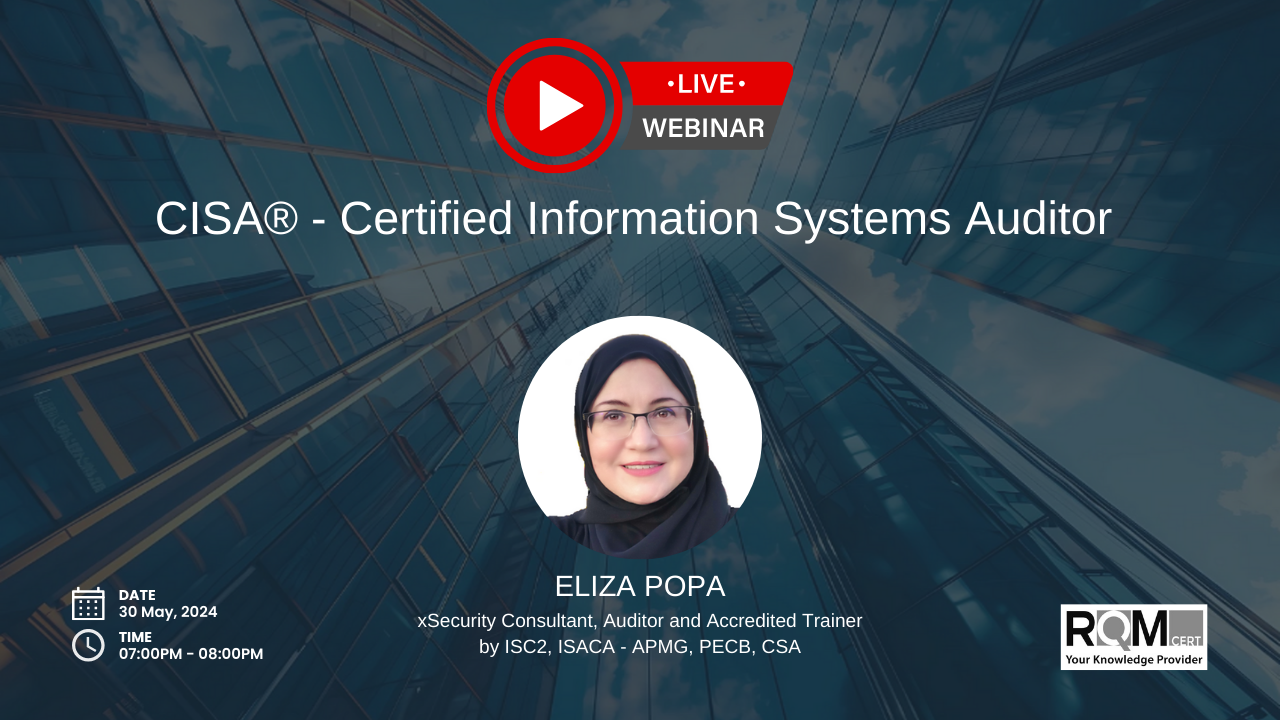Webinar CISA®—Certified Information Systems Auditor
Certified Information Systems Auditor®, world-renowned as the standard of achievement for auditing, monitoring, and assessing IT and business systems, also acknowledges the importance of emerging technologies.

Agenda
- Introduction of ISACA ATO and ISACA Trainer
- Benefits of holding a CISA certification
- CISA domain areas, key topics and skills
- CISA exam and exam results
- Q&A
What we will present to you at the webinar
Whether you're already immersed in the field of information systems auditing or just starting to explore its potential, this webinar will provide you with valuable insights and a pathway for growth. Further into the webinar, we will provide you with an overview of what to expect from the CISA training course, including domain areas, key topics, and the invaluable skills you'll acquire along the way. Additionally, we will be offering insights into the CISA exam.
Eligible applicants
There are no entry requirements to attend the CISA course. However, to apply for CISA Certification, candidates must demonstrate a total of five years or more of work experience, with a minimum of two years in information systems control, assurance, or security. For candidates with less than five years of work experience or insufficient professional experience, ISACA provides the option for experience substitution and educational experience waivers under certain conditions.
Position yourself for success with the in-demand CISA certification
Since its inception in 1978, more than 150,000 people have obtained ISACA®’s Certified Information Systems Auditor® (CISA®) certification. Join this community of elite professionals and get the recognition you deserve.
The first step to becoming CISA certified is to take and pass the CISA certification exam. The exam consists of 150 questions covering 5 job practice domains and tests your understanding of the knowledge and practical abilities an expert professional brings to the real-life job practice as it relates to information systems. Your ability to pass the exam will amount to substantial proof of your own expertise in these practical work-related domains:
1 Auditing Information Systems—providing audit services in accordance with standards to assist organizations in protecting and controlling information systems. Domain 1 affirms your credibility to offer conclusions on the state of an organization’s IS/IT security, risk and control solutions.
2 Governance and Management of IT— delivering assurance that the necessary leadership, structures and processes are in place to achieve organizational objectives and support strategy. Domain 2 confirms to stakeholders your abilities to identify critical issues and recommend enterprise-specific practices to support and safeguard the governance of information and related technologies.
3 Information Systems Acquisition, Development and Implementation— providing assurance that the practices in these areas will meet strategies and objectives.
4 Information Systems Operations, Maintenance and Service Management— providing assurance that processes also meet strategies and objectives. Domains 3 and 4 offer proof not only of your competency in IT controls, but also your understanding of how IT relates to business.
5 Protection of Information Assets— providing assurance that policies, standards, procedures and controls ensure the confidentiality, integrity and availability of information assets. Cybersecurity now touches virtually every information systems role, and understanding its principles, best practices and pitfalls is a major focus within Domain 5.
